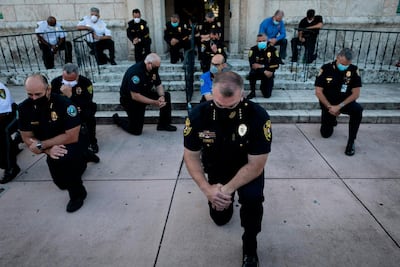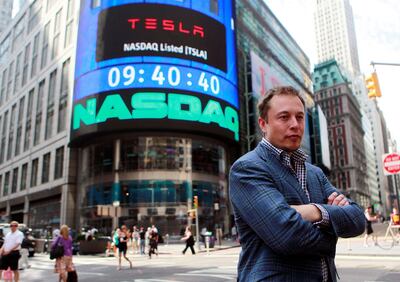“I can’t breathe” is the quote of 2020.
The devastating last words of George Floyd shook America and woke some in the country to persistent racism, wrapped like a parasite to a host, from the nation's largest institutions right down to the daily lives of its citizens.
While those words rang out to rally the cry once again that black lives matter, it was also the call to action for anyone addressing the Covid-19 pandemic, who were legion.
When facing death, and all shades of turmoil this year, we instinctively reach out of the present and into a future state. We become future-obsessed.
Like alchemy for the multiverse, our primal fight or flight response is all about escaping the present and altering the course ahead that spells certain death.
This goes even beyond healing America’s original sin or the triage and eradication of a global pandemic.
The conversations – and indeed the actions – over the health of the planet, the primacy of Big Tech, the implications of artificial intelligence and even our understanding of science have been hastened by our year of facing mortality.
This is some capital-F Future stuff.
While the internet has been around for decades, some were beginning to wonder if the hurdles to societal progress via computer science were too big to surmount. One of my last stories before the pandemic hit mulled the possibility of another AI winter, despite major leaps forward in the field.
Perhaps, I sometimes wondered, we are already the slovenly humans in constant, consuming repose, as seen in the Disney movie Wall-E. Perhaps solving our biggest existential threats at scale through sheer productivity is simply too difficult for our fragile human bodies.
But then 2020 happened. “I can’t breathe” happened. These were the words that brought our future forward – fatally, necessarily and urgently.

Geopolitical futurist Abishur Prakash told me this week that after nearly a decade of predicting a transition from the old world order governed by oil, 2020 was the year that made the jump. The axes of power on earth now rest on the infrastructure, application and development of technology, he said.
"The gains from truly mobilising the internet may in fact right now be swamping all of the accumulated obstacles we have put in the way of progres," Tyler Cowen, the renowned economist and author of the 2011 book The Great Stagnation, recently mused in a blog post.
In just this year alone, he could point to numerous signs of progress, most that were years in the making and had little to do with the novel coronavirus: the creation of Apple’s M1 chip, OpenAI’s GPT-3, which can produce predictive human-like speech, and DeepMind’s application of AI to protein folding, a challenge that has stymied scientists for half a century and has prevented breakthroughs in cures for diseases.
He also highlighted a phase-3 trial for a malaria vaccine; the use of gene editing technology CRISPR to achieve a cure for sickle cell; and the possibility of a universal flu vaccine and mRNA vaccines, like those developed by Moderna and Pfizer to inoculate against Covid-19.
Professor Cowen’s list continues.
He cited a new electric car battery from Toyota that can go 500 km on one charge and recharge from zero to full in 10 minutes. He pointed to China powering on its nuclear reactor, a kind of artificial sun that may one day generate clean power from nuclear fusion. Then there was space exploration, from the UAE's Mars mission to SpaceX, and the mile-high valuation of Tesla, which this week joined the S&P 500 only shortly after fossil fuel giant Exxon made its exit.

Despite forward momentum, The Economist this month was pointing out a global slowdown, citing figures from the World Bank, which surmises that sluggish trade growth and fewer moves by richer countries into new technology was having a knock-on effect in emerging markets by slowing productivity gains.
The magazine also blamed the skeptics, who continue to ponder if this is all too optimistic, if the precipice we believe to be standing on is solid ground or an apparition of a fantastical future. This is the crowd that likes to point to the 280 characters on Twitter that we got, and wonders where are the flying cars.
There is the doubt, upon which our survival rests: Will the changes we make through technology really provide the lifeline 2020 has shown us we so desperately need?
I often thought of a line from a Mary Oliver poem a year ago, when most of us were innocent to the virus barreling towards us to upend our lives. It is a line printed on the covers of journals, a reliable epigraph, appearing at the fronts of chick-lit novels: Tell me, what is it you plan to do/with your one wild and precious life?
Covering the people hellbent on changing our futures – through breakthroughs, massive amounts of money and radical ideas – always makes me think of it. Some of the people we write stories about seem to answer the question so fiercely.
It is the line for those crazies growing vegetables sustainably in one of the world's harshest climates, the UAE. It is a line you think of after talking to the co-founder of Virgin Hyperloop, hours after the first human test run of the technology he sketched on the back of a bar napkin years before. It is the blockchain believer in China, who can actually describe in plain language how a digital currency will work.
The plans are big and bold.
Seeing Facebook and Google in court are also good steps. These antitrust cases prove that society is starting to understand that the humanity in our digital lives is indeed worth something – and that our data cannot only be the spoils of behemoths.
We are understanding the stakes of our future and how it is twisted up in our tech.
It is easy to suppose that this difficult year will grind on into 2021. For proof, one can easily point to a new, more transmissible mutation in the virus.
But I disagree. When it was a little too warm in Abu Dhabi to be seeking solace in nature, like any good New Englander I read about it. I sought out Ms Oliver's poem, The Summer Day. This line stopped me cold: Tell me, what else should I have done?
Our lives are precious, this we know. But 2020 forced us to ask this question, over and over and over again.
It was a response to "I can't breathe." It was and is the primal strength of our fragile human bodies that we instinctively grasp for a different future.
It is reason enough for hope.
Kelsey Warner is future editor at The National



